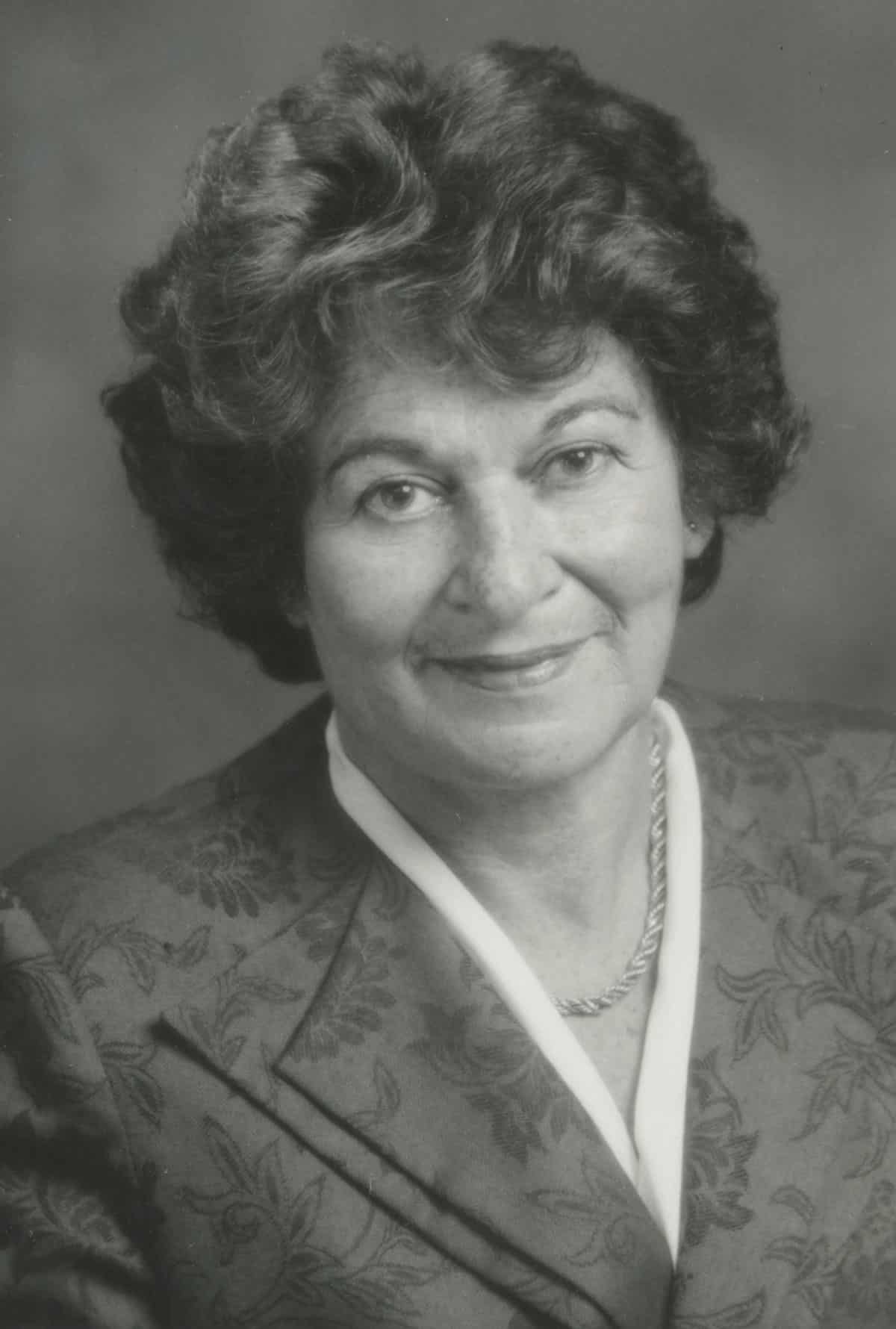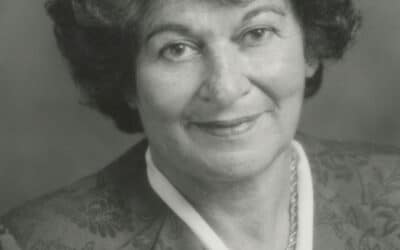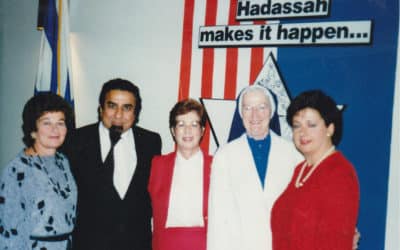People A-Z / Gerda Weissmann Klein
Humanitarian, Holocaust Survivor, author, public speaker and Presidential Medal of Freedom honoree.
1924-2022
Overview
From Bielsko to Volary
Gerda Weissmann (later Klein) was born in Bielsko, Poland, on May 8, 1924. Growing up into a middle-class Jewish family, Gerda Weissmann’s life was shattered when she was 15 years old in September 1939. German forces invaded Poland and within a month her brother Artur was taken away by the Nazis never to return. Gerda and her parents were forced into the basement of their family home as it was stripped. Then along with other Jewish residents, they were imprisoned in the Bielsko Ghetto, and some were sent into slave labor. Gerda was eventually separated from her parents, who later died in the concentration camps, while she was sent into a series of slave labor camps at Marzdorf, Landshut and Gruenberg. After barely surviving these, Gerda was forced onto a Death March ending in Volary, Czechoslovakia on May 7, 1945.
In May 1945, Kurt Klein and his American military unit helped liberate this group of female slave laborers and prisoners, who had been abandoned after walking 350 miles. Most had died along the Death March. Gerda Weissmann, as one of the survivors, and barely able to stand herself, introduced Kurt Klein to the other death march survivors. Transferred to hospital, Gerda became critically ill. Kurt Klein visited often, and learned that Gerda had lost almost all of her family including her parents, Julius and Helene Weissmann and her only sibling, Artur Weissmann. Despite many obstacles, and after almost a year of separation while Kurt fulfilled his remaining military duties, they married in Paris in June 1946.
Post war life In Buffalo, New York
Gerda Klein settled in Buffalo with Kurt in 1947. Kurt Klein had founded his own printing and editing company, Kiesling-Klein Printing. Together they raised a family, welcoming three children: Leslie, Vivian and James. In the meantime, Gerda Weissmann Klein began to speak about her experiences of the Holocaust from the late 1940s. She emerged as a gifted writer and speaker, able to reach adults and children, on a range of subject areas. She wrote an almost twenty year-long running news column: Stories for Young Readers. But her most widely acclaimed work is the story of her own survival during the Holocaust. All But My Life was published in 1957 and Kurt served as editor. Since then, this work has had over 60 printings, and is available in multiple languages. A testimony of Gerda’s hope and survival against all odds, it led to a life of educating about the Holocaust and the value of tolerance and community service.
Community Service in Buffalo, New York
To build greater understanding about the Holocaust and the need for action against totalitarianism, antisemitism and hatred towards others, Gerda spoke about her experiences in various settings. In the 1950s, Hadassah in Buffalo had multiple chapters. A new group formed in 1957 under the name of IMA (Hebrew: mother) for members who were former refugees, death camp survivors, Displaced Persons (DPs) and new immigrants. IMA members were drawn mainly from Europe, especially Poland and Germany, as well as from Egypt following the Suez Crisis. This group took a special interest in Youth Aliyah and raised money to sponsor children in youth villages in Israel. Gerda Klein was an active part of this group and a sought-after speaker.
Her public speaking commitments grew throughout the 1950s and 1960s, with a focus on youth, college and interfaith circles audiences as well as Jewish organizations and agencies. She was actively involved with United Jewish Appeal (UJA) and Israel Bonds and traveled extensively to Jewish Federations around America, and was especially sought after, following her speech at the National UJA Conference in 1962. She was a mission leader for visits to Israel as part of the Women’s Division of the UJA from the mid 1960s.
During the 1970s, she was the recipient of many local awards. She received the Women of the Year Award from the Buffalo section of the National Council of Jewish Women in 1974. The following year, in 1975, she received a Doctor of Humane Letters from Daemen University, then known as Rosary Hill College (and later Daemen College). A decade earlier, Gerda Klein had formed a close association with Rosary Hill College through her involvement with the Library’s Silver Circle. Other awards followed recognizing her educational and civic contributions, including D’Youville College and Buffalo Hadassah’s, Myrtle Wreath Award in 1985.
As part of a group of local survivors, in the 1980s, she became part of a founding group for the Holocaust Resource Center. This began initially as a Holocaust Resource Center Study Committee in July 1980. The committee drew its membership from educators and survivors and eventually evolved into both a commemorative programming organization and a resource and training center with an active testimonies program.
In addition to her work in Holocaust education, Gerda Weissmann Klein was involved in raising understanding around developmental differences. She was one of the Founders of the Blue Rose Foundation, which emerged from a book she wrote about a young girl (and her neighbor) who was facing severe health challenges, made worse by lack of empathy and understanding. This book, The Blue Rose, was recently reissued in 2008. Always interested in the work of social justice, she researched the life of Edith Rosenwald Stern in another book, chronically Edith Stern’s support of educational institutions serving African Americans, building on the legacy of her father, Julius Rosenwald. Stern helped build Dillard University in New Orleans, in partnership with the African American community, and was active in other causes for social justice.
Educator and Public Speaker
After Kurt Klein retired from his business in 1985, Gerda Klein continued to develop her national and international Holocaust education engagements, and civic and humanitarian work often with Kurt. They moved from Buffalo to Scottsdale, Arizona, to be closer to two of their children. Retirement was short lived. In the wake of a mass school shooting perpetrated by students, Gerda and Kurt Klein spoke at the invitation of officials at Columbine High School in 1999, and were featured in a special edition of Nightline: A Holocaust Survivor Speaks at Columbine High School that aired in March 2000. That same year Gerda and Kurt Klein also wrote a book together, based on a compilation of their letters during their one-year separation after the Holocaust, entitled The Hours After: Letters of Love and Longing. This would later become the source of a theatre play: Gerda’s Lieutenant. In 2001, Chapman University awarded Kurt Klein and Gerda Weissmann Klein, a Joint Honorary Doctorate of Humane Letters.
Much of the educational work Gerda and Kurt Klein in civics and Holocaust education was powered their establishment of the Gerda and Kurt Klein Foundation. The Foundation was dedicated to Holocaust education, combating hunger and intolerance and supporting civic endeavor. That work has since become a central part of several other independent organizations including Facing History and Ourselves, Learning for Justice and Citizenship Counts. Gerda Weissmann Klein provided her personal accounts and her experience of antisemitism and life under Nazism to numerous educational organizations. In addition, believing in the power of testimony, she widely recorded her story in Buffalo, her adopted home town, and for national Holocaust organizations including the Shoah Foundation.
After Kurt Klein’s sudden death in Guatemala in 2002, Gerda Weissmann Klein continued to take the messages of teaching tolerance and the capacity of friendship and hope to groups and audiences across the world. In 2011, she was awarded the Presidential Medal of Freedom by Barack Obama.
Publications
Gerda Weissmann Klein created a significant body of writings from the 1950s, for adults and children, as well as educators. Apart from numerous extended articles and newspaper pieces about her experiences during the Holocaust, she wrote nine books. In addition to her autobiography, All But My Life she wrote several other books that touched directly on the Holocaust. These included: Promise of a New Spring: The Holocaust and Renewal (1981); The Hours After: Letters of Love and Longing (2000), A Boring Evening at Home (2004) and One Raspberry (2009). Her other books touch on a variety of subjects: The Blue Rose (1974), A Passion for Sharing: The Life of Edith Rosenwald Stern (1984), Peregrinations: Adventures with the Green Parrot (1986), Wings of Epoh (2008) and The Windsor Caper (2013). These works, as much as those related to the Holocaust, focus on themes of courage, friendship and love. They often highlight the value of community and social action and provide a model for humanitarian living.
Books by Gerda Weissmann Klein
-
All But My Life (1957)
-
The Blue Rose (1974)
-
Promise of a New Spring: The Holocaust and Renewal (1981)
-
A Passion for Sharing: The Life of Edith Rosenwald Stern (1984)
-
Peregrinations: Adventures with the Green Parrot (1986)
-
The Hours After: Letters of Love and Longing in War’s Aftermath, with Kurt Klein (2000)
-
A Boring Evening at Home (2004)
-
Wings of Epoh (2008)
-
One Raspberry (2009)
-
The Windsor Caper (2013)
Books co-written with Kurt Klein
-
With Gerda Weissmann Klein, The Hours After: Letters of Love and Longing in War’s Aftermath. St. Martin’s Press; 2000
Theater Production
Gerda’s Lieutenant: A Remarkable True Story of Love, Loss and Survival. Based on book, Letters of Love and Longing in War’s Aftermath. St. Martin’s Press; 2000
Awards, including the Acceptance Speech at the Oscars (selected list)
-
Chapman University, Kurt Klein and Gerda Weissmann Klein, Joint Honorary Doctorate of Humane Letters, 2001.
-
Gerda Weissmann Klein, “One Survivor Remembers,“ 68th Annual Academy Awards, Best Documentary Short Subject, Oscar acceptance speech, 2008
Online Articles
Holocaust survivor, author Gerda Weissmann Klein dies at 97
Holocaust survivor, author Gerda Weissmann Klein dies at 97, WIBV, Anita Snow, April 15, 2022
Gerda Weissmann Klein, 97, Holocaust survivor who turned horror into compassion
Gerda Weissmann Klein, 97, Holocaust survivor who turned horror into compassion, Buffalo News, April 7, 2022
Gerda Weissmann Klein, Honored Holocaust Survivor, Dies at 97
Gerda Weissmann Klein, Honored Holocaust Survivor, Dies at 97, The New York Times, April 8, 2022
Remembering Holocaust survivor, author and Oscar winner Gerda Weissmann Klein, a ‘testament to tenacity’
Remembering Holocaust survivor, author and Oscar winner Gerda Weissmann Klein, a ‘testament to tenacity’, Forward, Michael Berenbaum, April 06, 2022
Video
Video Oral History Testimonies with Transcripts
Oral history interview with Gerda Weissmann Klein, Oral History | RG Number: RG-50.030.0105
Video tribute to Gerda Weissmann Klein
An extensive tribute to the life and legacy of Gerda Weissman Klein.
Death March to Volary
This extensive online exhibition was created by Yad Vashem and includes detailed timelines and testimony of survivors and liberators including materials relating to Kurt Klein and Gerda Weissmann (Klein). Towards the end of January 1945, over a thousand female Jewish slave laborers and prisoners were forced on a death march for hundreds of miles from Poland to Volary in Czechoslovakia. As they passed other camps on their journey southwards more women prisoners were added to the march that lasted 106 days through snow, rain and freezing conditions. At its end in Volary, 120 survivors of the march were abandoned in factory outhouses and finally liberated by American soldiers in May 1945. Some of the women died on the day of their liberation, while others died in the days after in hospital.
Gallery
Portrait of Gerda Weissmann Klein, Courtesy of the Buffalo Jewish Federation.
Portrait of Gerda Weismann Klein
Buffalo Hadassah Myrtle Wreath Awardees, 1985-1986, Gerda Klein on far left, Sister Martin Jones on second from right with nun’s habit, Courtesy of Buffalo Hadassah.
Buffalo Hadassah Myrtle Wreath Awardees, 1985-1986
Discover More
Archival and primary source collections
- Gerda Weissmann and Kurt Klein Papers 1940s-2012 MSS-347, Arizona State University Library, Rare Books and Manuscripts, Tempe, Arizona.
Educational Resources about the Jews of Bielsko
- YIVO Encyclopedia entry on the history of Bielsko
- Yizkor Book: Chapters From the Past, (Bielsko Biała, Poland) Translation of “Bielitz-Biala pirkei avar.” Editor: Elijahu Miron, Published in Israe,l 1973. Made available through Yad Vashem, and Jewish Gen.
- Gesher Galicia online Resources on Galician Jewish Life
- Polin: Virtual Shtetl about Bielsko
Educational Resources and Foundations linked to Gerda and Kurt Klein
- The Gerda and Kurt Klein Foundation, was founded to teach tolerance, lessen prejudice and promote community service.
- Massachusetts Corporation for Educational Telecommunications, Memories, Voices, and Choices: Lessons Learned from the Holocaust and Global Genocides
- Klein Foundation/TIME, Stand Up, Speak Out, Lend a Hand, 2003.
- Facing History and Ourselves: a global collection to teach students about racism, antisemitism and prejudice.
- One Survivor Remembers kit, Teaching Tolerance’s Curriculum.




